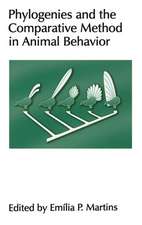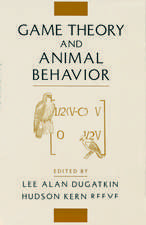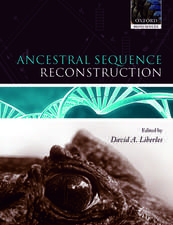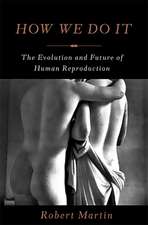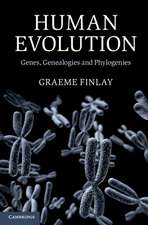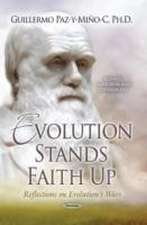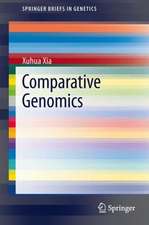Ancestors in Our Genome: The New Science of Human Evolution
Autor Eugene E. Harrisen Limba Engleză Hardback – 22 ian 2015
| Toate formatele și edițiile | Preț | Express |
|---|---|---|
| Paperback (1) | 110.36 lei 31-37 zile | |
| Oxford University Press – 17 sep 2019 | 110.36 lei 31-37 zile | |
| Hardback (1) | 155.98 lei 31-37 zile | |
| Oxford University Press – 22 ian 2015 | 155.98 lei 31-37 zile |
Preț: 155.98 lei
Preț vechi: 191.08 lei
-18% Nou
Puncte Express: 234
Preț estimativ în valută:
29.85€ • 31.05$ • 24.64£
29.85€ • 31.05$ • 24.64£
Carte tipărită la comandă
Livrare economică 03-09 aprilie
Preluare comenzi: 021 569.72.76
Specificații
ISBN-13: 9780199978038
ISBN-10: 0199978034
Pagini: 248
Ilustrații: 45 b/w
Dimensiuni: 243 x 177 x 21 mm
Greutate: 0.46 kg
Editura: Oxford University Press
Colecția OUP USA
Locul publicării:New York, United States
ISBN-10: 0199978034
Pagini: 248
Ilustrații: 45 b/w
Dimensiuni: 243 x 177 x 21 mm
Greutate: 0.46 kg
Editura: Oxford University Press
Colecția OUP USA
Locul publicării:New York, United States
Recenzii
[Harris] has written an excellent analysis of modern human evolution from a molecular evolution perspective. [...] This is the best book I've ever read on the subject of random genetic drift.
... a good overview of the state of the science regarding the genomics of human evolution.
... readers looking for an up-to-date, clearly written, and well-illustrated tour through the dynamics of human evolution will find no better guide than this compelling volume.
[O]n the whole this is a substantive, engaging, and worthwhile introduction to molecular anthropology for educated nonexperts.
In the 'Age of Genomics,' this book is an absolute must-have for anyone interested in human evolution. In the most accessible manner, Eugene E. Harris enlightens how and why genomes represent such powerful evidence to understand our past. If you want to know why paleontologists and geneticists fight over evolutionary trees, whether chimpanzees and primitive hominins interbred after they split, how large the first human population was, or how in modern humans bad genes could become good genes, open Ancestors in Our Genome
It is a daunting and confusing task to make sense of the avalanche of genetic information that has recently become available. Fortunately, Harris's book is a concise and engaging explanation of what we have learned about human evolution from studying genomes. Harris clearly explains without jargon the basics of genetics and genomics, how and when humans evolved, and what about our genes make us different from our closest living and extinct relatives
In a lucid and engaging style, Eugene Harris delivers a clear account of the latest insights in genomic studies that are giving humans a more comprehensive understanding of our evolutionary history, our place in nature, and where we may be headed
Ancestors in Our Genome tells the amazing story of human evolution as it has been revealed by the study of our DNA. Eugene Harris, a rare anthropologist who has studied the differences in the DNA of humans and other primates, has written a superb book about the latest discoveries comparing the DNA genomes of apes and humans-both living and fossilized ... An enjoyable and wonderfully enlightening read
Simply indispensable for any reader wishing to learn about the latest research on human origins
He [Harris] presents a sophisticated introduction to population genetics, explaining how gene data can be used to verify or dismiss competing hypotheses for how and when early humans moved out of Africa; the size and timing of the ancestral population that gave rise to both humans, and perhaps human ancestors, developed the ability to speak.
... a good overview of the state of the science regarding the genomics of human evolution.
... readers looking for an up-to-date, clearly written, and well-illustrated tour through the dynamics of human evolution will find no better guide than this compelling volume.
[O]n the whole this is a substantive, engaging, and worthwhile introduction to molecular anthropology for educated nonexperts.
In the 'Age of Genomics,' this book is an absolute must-have for anyone interested in human evolution. In the most accessible manner, Eugene E. Harris enlightens how and why genomes represent such powerful evidence to understand our past. If you want to know why paleontologists and geneticists fight over evolutionary trees, whether chimpanzees and primitive hominins interbred after they split, how large the first human population was, or how in modern humans bad genes could become good genes, open Ancestors in Our Genome
It is a daunting and confusing task to make sense of the avalanche of genetic information that has recently become available. Fortunately, Harris's book is a concise and engaging explanation of what we have learned about human evolution from studying genomes. Harris clearly explains without jargon the basics of genetics and genomics, how and when humans evolved, and what about our genes make us different from our closest living and extinct relatives
In a lucid and engaging style, Eugene Harris delivers a clear account of the latest insights in genomic studies that are giving humans a more comprehensive understanding of our evolutionary history, our place in nature, and where we may be headed
Ancestors in Our Genome tells the amazing story of human evolution as it has been revealed by the study of our DNA. Eugene Harris, a rare anthropologist who has studied the differences in the DNA of humans and other primates, has written a superb book about the latest discoveries comparing the DNA genomes of apes and humans-both living and fossilized ... An enjoyable and wonderfully enlightening read
Simply indispensable for any reader wishing to learn about the latest research on human origins
He [Harris] presents a sophisticated introduction to population genetics, explaining how gene data can be used to verify or dismiss competing hypotheses for how and when early humans moved out of Africa; the size and timing of the ancestral population that gave rise to both humans, and perhaps human ancestors, developed the ability to speak.
Notă biografică
Eugene Harris is a Research Affiliate of the Center for the Study of Human Origins in the Department of Anthropology at New York University. He is one of the leading experts in the genomic study of primate evolution. His early research, using modern DNA analyses to firmly establish an evolutionary tree of the African monkey group that includes baboons, mandrills and related monkeys, was influential in human evolution studies showing that anatomical features are unreliable for ascertaining the evolutionary relationships among early human fossils.

